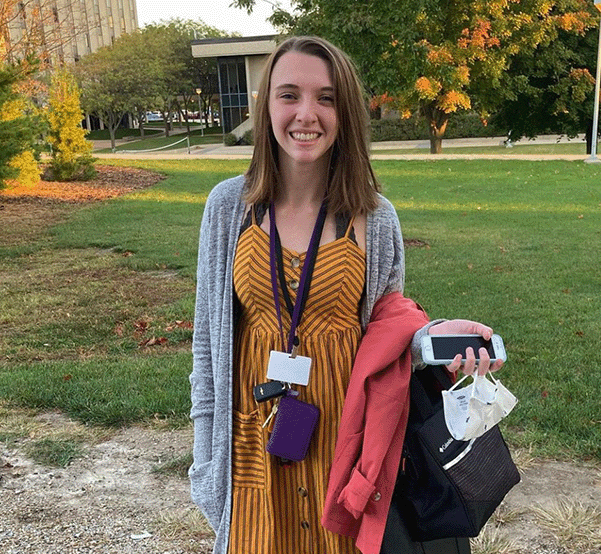Baylee Smith
Baylee Smith

Baylee Smith
In December 2021 you graduated with a BA in Elementary Education and Middle Grade Education. Why did you decide to become a teacher and study the dual track?
I decided to become a teacher back in high school. I have always been a student who loves education and realized around junior year that I had a passion for working with children. Through my school district, I had the opportunity to work in an elementary classroom for several hours every day for an entire semester. This opportunity confirmed that I loved working with and teaching children in a multitude of subjects. While I was fairly positive that I did not want to focus on high school education, I was unsure of what grade would fit me best until later in my college career. After completing both my Level 1s and Level 2s at UNI, I realized that while elementary school students are amazing, I love teaching middle-level curriculum. Creating lesson plans and activities for my students to participate in is much more rewarding when I am working with the middle-level ages.
Why did you add a math minor?
I added my math minor soon after completing Math Reasoning 1 my first semester at UNI. Taking calculus in high school had left me feeling rather burnt out from math. Going into college, I was certain I would minor in science or literature. It was Math Reasoning 1 that showed me that I never truly understood math before. My K-12 education never explained why long multiplication worked. I was never shown why fractions work. My education experience showed me all of the steps without ever actually explaining the “why”. Math Reasoning 1 made me want to teach students how to think about the subject differently. Whether working individually with a student or talking in front of an entire class, it is impossible to miss the “lightbulb” moment. My favorite part about teaching math is when I get to see those lightbulb moments as students finally understand why math works. In my experience, as soon as they understand why, the actual process becomes so much easier.
You served as a president of Student Association of Middle Level Educators (SAMLE) for two years. What are some of the group’s accomplishments or activities you are most proud of?
My favorite part about working for SAMLE is the Middle-Level Conference that the group holds every spring. Unfortunately, we were not able to hold the conference in 2020 or 2021 due to COVID-19, but my experience at the 2019 conference is actually what led me to run for the presidency position in the first place. This conference gives middle school students the opportunity to develop leadership skills and gives UNI students hands-on experience working with middle schoolers. I am also very proud of the active role that SAMLE played in the College during the 2020-21 school year. As an executive board, we felt as though it would not benefit our student members for us to host yet another weekly Zoom meeting for them to attend. Instead, we used our funds to create free resource kits for students to use in their future classes. These resources kits included free books, lesson plans, and other supplies. We had one kit during the fall semester and then one kit every month in the spring semester. Each kit was themed differently with themes like racial inclusivity in the classroom, LGBTQ+ representation, Earth Day, etc. I felt as though UNI education students were actually excited about these packets and that SAMLE found a creative way to continue providing resources to our members during a difficult school year.
You serve as an undergraduate research assistant at UT Arlington. What project(s) are you working on?
I am working at the UT Arlington as a research assistant for a project currently called Virtual Number Talks. Dr. Candace Joswick is my main contact as she is the coordinator for the project at UT Arlington. However, I am also able to work with Dr. Kimberly Conner here at UNI as she is working along with Dr. Joswick. My main role currently is to create transcripts for the pre-recorded videos that teachers have sent in for the project. Each teacher who participates in this project worked with three-four students in virtual meetings. The researchers for this project made assignments for each teacher to complete with their students and then the teachers made a video for each assignment over a number of months. My job is to create clear transcripts for each video so that the researchers can look for patterns in student thinking/understanding without having to constantly refer back to the videos. Through this work, I am able to view how a large number of teachers approach math with their students and I am able to see the extremely varied approaches that students use when it comes to solving mathematics problems. This project still has a lot of work to be done, and I look forward to continue working with Dr. Joswick and Dr. Conner as they delve into student thinking.
What is your favorite UNI memory?
My favorite UNI memory was working with the Honors and Scholar Program. Being in the Honors Program allowed me to make a lot of close connections with both peers and mentors that I do not think I would have otherwise had access to. I love learning and being around people who are passionate about the things I am passionate about. The Honors Program allowed me to be around those people. Additionally, it was my mentor within the Honors Program that inspired me to continue my education after student teaching and pursue my master’s degree in Student Affairs. Hopefully (pending admission), I will be able to continue making favorite memories at UNI as a graduate student in the Fall of 2022.

